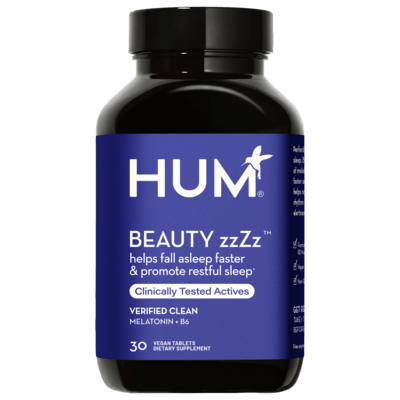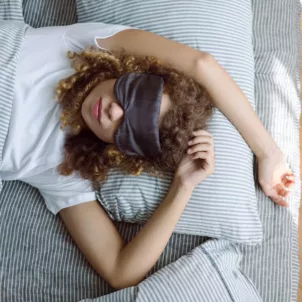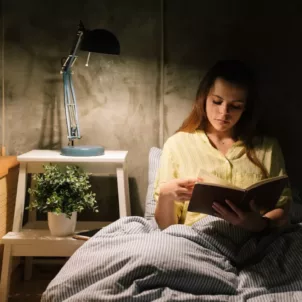Seven ways to get a more restful night of beauty sleep.
Ah, the elusive “good night’s sleep.” By now, we’re all aware that it’s essential for living a healthy lifestyle, but it can be oh-so-tempting to watch just a few more episodes of House of Cards.
Suddenly, you’re exhausted every morning—like, six cups of coffee and nothing tired—and you have trouble falling asleep at night. Sound familiar? It’s time for a wake-up call. When you don’t get enough sleep, it messes with your overall health, memory, and ability to lose weight. And since sleep is when your body is in repair mode, a lack of sleep can totally compromise your skin. One 2013 study even found that poor sleepers showed more visible signs of aging, such as fine lines.
But it’s not all doom and gloom. Scientists have pinpointed a few easy lifestyle changes that can have a major impact on the quality of your sleep. Keep reading to find out what to do to sleep better tonight!
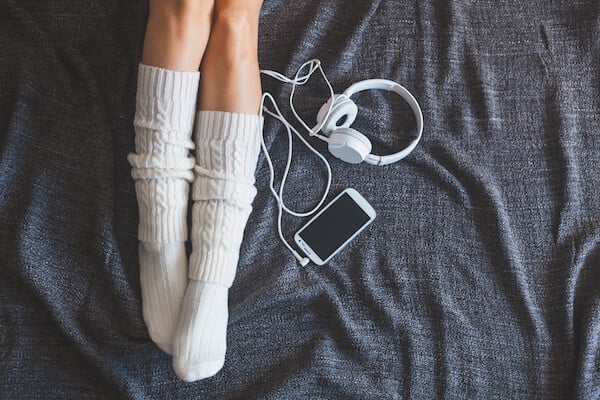 Research shows that the more the blood vessels in your hands and feet dilate (called vasodilation), the faster you fall asleep. So how do you facilitate vasodilation? Put on some socks. This helps optimize your body temperature for sleeping, because it helps with blood flow and heat distribution that signals to your brain that it’s time to snooze.
Research shows that the more the blood vessels in your hands and feet dilate (called vasodilation), the faster you fall asleep. So how do you facilitate vasodilation? Put on some socks. This helps optimize your body temperature for sleeping, because it helps with blood flow and heat distribution that signals to your brain that it’s time to snooze.
 Stress makes it hard to turn your brain off and relax. It’s a vicious cycle, because if you don’t get enough sleep your body produces more stress hormones. To combat this, try keeping a “worry journal.” It’s pretty much exactly what it sounds like. Designate a notebook as your journal, then write down the things that are causing you anxiety before you go to bed. You can also write down the ideas you have to help resolve those issues. Studies have shown that writing things down helps clear them out of your brain, which can help when your brain obsesses over stressors.
Stress makes it hard to turn your brain off and relax. It’s a vicious cycle, because if you don’t get enough sleep your body produces more stress hormones. To combat this, try keeping a “worry journal.” It’s pretty much exactly what it sounds like. Designate a notebook as your journal, then write down the things that are causing you anxiety before you go to bed. You can also write down the ideas you have to help resolve those issues. Studies have shown that writing things down helps clear them out of your brain, which can help when your brain obsesses over stressors.
 There’s an optimal temperature for sleeping: between 60-67 degrees Fahrenheit. When you get tired, your internal temperature drops. A cool environment can help trigger a sleepy response in your brain. Conversely, if your room is too hot it can mess with your body’s temperature regulation and make for some seriously restless sleep. Some studies have even linked insomnia to poor temperature regulation in the body.
There’s an optimal temperature for sleeping: between 60-67 degrees Fahrenheit. When you get tired, your internal temperature drops. A cool environment can help trigger a sleepy response in your brain. Conversely, if your room is too hot it can mess with your body’s temperature regulation and make for some seriously restless sleep. Some studies have even linked insomnia to poor temperature regulation in the body.
 Exercise has been proven to help people sleep better at night and feel more alert during the day. Aim for at least 150 minutes of exercise per week (only two and a half hours).
And it doesn’t matter what time of day you work out, says science. Exercise increases your core temperature and tells your body to release adrenaline; people believed this make it hard to wind down. But new research suggests that late-night exercise doesn’t upset your sleep quality. (Read: There’s no excuse to skip your after-work sweat sesh.) One poll even found that 83 percent of people who exercise say they sleep better than people who don’t work out at all.
However, if you find that you feel wired when you work out at night, listen to your body. Give yourself a pad of a three-to-four hours between your workout and your bedtime to let your body calm down.
Exercise has been proven to help people sleep better at night and feel more alert during the day. Aim for at least 150 minutes of exercise per week (only two and a half hours).
And it doesn’t matter what time of day you work out, says science. Exercise increases your core temperature and tells your body to release adrenaline; people believed this make it hard to wind down. But new research suggests that late-night exercise doesn’t upset your sleep quality. (Read: There’s no excuse to skip your after-work sweat sesh.) One poll even found that 83 percent of people who exercise say they sleep better than people who don’t work out at all.
However, if you find that you feel wired when you work out at night, listen to your body. Give yourself a pad of a three-to-four hours between your workout and your bedtime to let your body calm down.
 We know, we know: Weekends are for binge-watching Netflix shows. But in the name of better sleep, you’ve got to learn when to cut yourself off. Research shows that going to bed and waking up at the same time every day help you get a more restful night of sleep. Why? It helps keep your body’s sleep cycles (aka circadian system) functioning smoothly.
We know, we know: Weekends are for binge-watching Netflix shows. But in the name of better sleep, you’ve got to learn when to cut yourself off. Research shows that going to bed and waking up at the same time every day help you get a more restful night of sleep. Why? It helps keep your body’s sleep cycles (aka circadian system) functioning smoothly.
 A lavender aromatherapy oil, like This Works Deep Sleep Night Oil, will help create a relaxing, stress-free environment for sleep. Smelling lavender oil decreases autonomic arousal. In plain terms terms, inhaling it helps decrease your heart rate. One study reports that people sleep more deeply after sniffing lavender oil than those who sniff distilled water.
A lavender aromatherapy oil, like This Works Deep Sleep Night Oil, will help create a relaxing, stress-free environment for sleep. Smelling lavender oil decreases autonomic arousal. In plain terms terms, inhaling it helps decrease your heart rate. One study reports that people sleep more deeply after sniffing lavender oil than those who sniff distilled water.
 Try melatonin. It’s a natural hormone that our bodies produce that helps us sleep. Typically, your brain releases more melatonin at night. Taking a melatonin supplement like HUM’S Beauty zzZz can help reduce the amount of time it takes you to fall asleep. It’s also amazing if you have jet lag or work night shifts, since it can help regulate a disrupted circadian rhythm.
Try melatonin. It’s a natural hormone that our bodies produce that helps us sleep. Typically, your brain releases more melatonin at night. Taking a melatonin supplement like HUM’S Beauty zzZz can help reduce the amount of time it takes you to fall asleep. It’s also amazing if you have jet lag or work night shifts, since it can help regulate a disrupted circadian rhythm.
7 Ways TO Sleep Better
Put Socks On
 Research shows that the more the blood vessels in your hands and feet dilate (called vasodilation), the faster you fall asleep. So how do you facilitate vasodilation? Put on some socks. This helps optimize your body temperature for sleeping, because it helps with blood flow and heat distribution that signals to your brain that it’s time to snooze.
Research shows that the more the blood vessels in your hands and feet dilate (called vasodilation), the faster you fall asleep. So how do you facilitate vasodilation? Put on some socks. This helps optimize your body temperature for sleeping, because it helps with blood flow and heat distribution that signals to your brain that it’s time to snooze.
Keep a “Worry Journal”
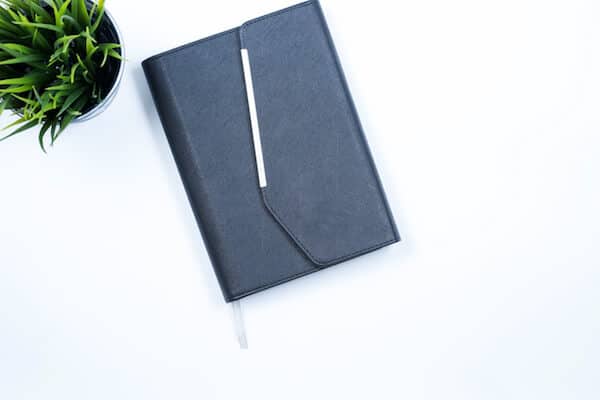 Stress makes it hard to turn your brain off and relax. It’s a vicious cycle, because if you don’t get enough sleep your body produces more stress hormones. To combat this, try keeping a “worry journal.” It’s pretty much exactly what it sounds like. Designate a notebook as your journal, then write down the things that are causing you anxiety before you go to bed. You can also write down the ideas you have to help resolve those issues. Studies have shown that writing things down helps clear them out of your brain, which can help when your brain obsesses over stressors.
Stress makes it hard to turn your brain off and relax. It’s a vicious cycle, because if you don’t get enough sleep your body produces more stress hormones. To combat this, try keeping a “worry journal.” It’s pretty much exactly what it sounds like. Designate a notebook as your journal, then write down the things that are causing you anxiety before you go to bed. You can also write down the ideas you have to help resolve those issues. Studies have shown that writing things down helps clear them out of your brain, which can help when your brain obsesses over stressors.
Turn Down the Temperature
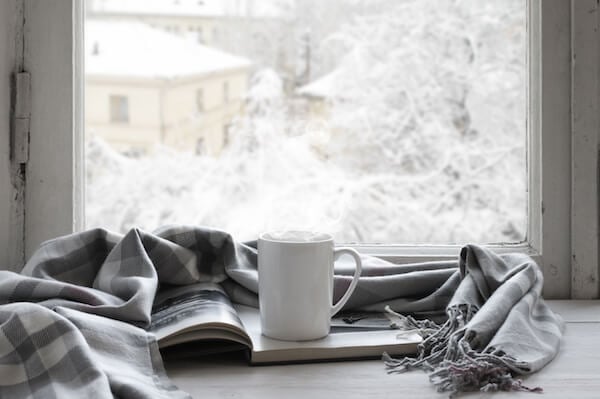 There’s an optimal temperature for sleeping: between 60-67 degrees Fahrenheit. When you get tired, your internal temperature drops. A cool environment can help trigger a sleepy response in your brain. Conversely, if your room is too hot it can mess with your body’s temperature regulation and make for some seriously restless sleep. Some studies have even linked insomnia to poor temperature regulation in the body.
There’s an optimal temperature for sleeping: between 60-67 degrees Fahrenheit. When you get tired, your internal temperature drops. A cool environment can help trigger a sleepy response in your brain. Conversely, if your room is too hot it can mess with your body’s temperature regulation and make for some seriously restless sleep. Some studies have even linked insomnia to poor temperature regulation in the body.
Get Your Exercise In
 Exercise has been proven to help people sleep better at night and feel more alert during the day. Aim for at least 150 minutes of exercise per week (only two and a half hours).
And it doesn’t matter what time of day you work out, says science. Exercise increases your core temperature and tells your body to release adrenaline; people believed this make it hard to wind down. But new research suggests that late-night exercise doesn’t upset your sleep quality. (Read: There’s no excuse to skip your after-work sweat sesh.) One poll even found that 83 percent of people who exercise say they sleep better than people who don’t work out at all.
However, if you find that you feel wired when you work out at night, listen to your body. Give yourself a pad of a three-to-four hours between your workout and your bedtime to let your body calm down.
Exercise has been proven to help people sleep better at night and feel more alert during the day. Aim for at least 150 minutes of exercise per week (only two and a half hours).
And it doesn’t matter what time of day you work out, says science. Exercise increases your core temperature and tells your body to release adrenaline; people believed this make it hard to wind down. But new research suggests that late-night exercise doesn’t upset your sleep quality. (Read: There’s no excuse to skip your after-work sweat sesh.) One poll even found that 83 percent of people who exercise say they sleep better than people who don’t work out at all.
However, if you find that you feel wired when you work out at night, listen to your body. Give yourself a pad of a three-to-four hours between your workout and your bedtime to let your body calm down.
Stick to a Schedule
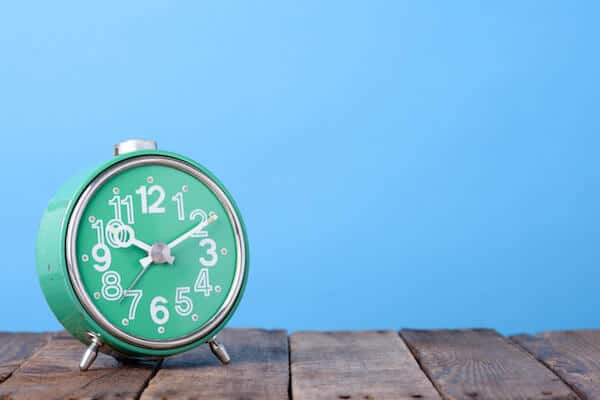 We know, we know: Weekends are for binge-watching Netflix shows. But in the name of better sleep, you’ve got to learn when to cut yourself off. Research shows that going to bed and waking up at the same time every day help you get a more restful night of sleep. Why? It helps keep your body’s sleep cycles (aka circadian system) functioning smoothly.
We know, we know: Weekends are for binge-watching Netflix shows. But in the name of better sleep, you’ve got to learn when to cut yourself off. Research shows that going to bed and waking up at the same time every day help you get a more restful night of sleep. Why? It helps keep your body’s sleep cycles (aka circadian system) functioning smoothly.
Set the Mood
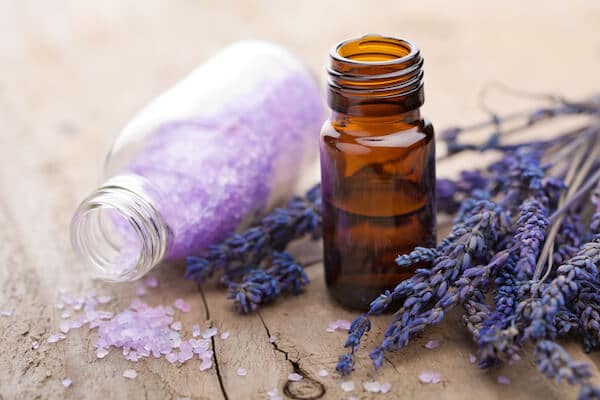 A lavender aromatherapy oil, like This Works Deep Sleep Night Oil, will help create a relaxing, stress-free environment for sleep. Smelling lavender oil decreases autonomic arousal. In plain terms terms, inhaling it helps decrease your heart rate. One study reports that people sleep more deeply after sniffing lavender oil than those who sniff distilled water.
A lavender aromatherapy oil, like This Works Deep Sleep Night Oil, will help create a relaxing, stress-free environment for sleep. Smelling lavender oil decreases autonomic arousal. In plain terms terms, inhaling it helps decrease your heart rate. One study reports that people sleep more deeply after sniffing lavender oil than those who sniff distilled water.
POP a Supplement
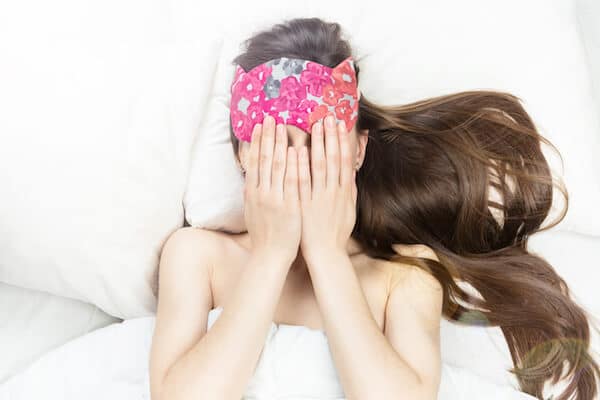 Try melatonin. It’s a natural hormone that our bodies produce that helps us sleep. Typically, your brain releases more melatonin at night. Taking a melatonin supplement like HUM’S Beauty zzZz can help reduce the amount of time it takes you to fall asleep. It’s also amazing if you have jet lag or work night shifts, since it can help regulate a disrupted circadian rhythm.
Try melatonin. It’s a natural hormone that our bodies produce that helps us sleep. Typically, your brain releases more melatonin at night. Taking a melatonin supplement like HUM’S Beauty zzZz can help reduce the amount of time it takes you to fall asleep. It’s also amazing if you have jet lag or work night shifts, since it can help regulate a disrupted circadian rhythm.
More like this
